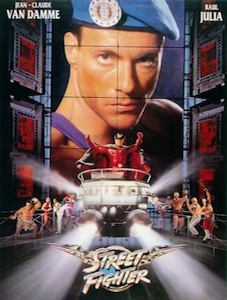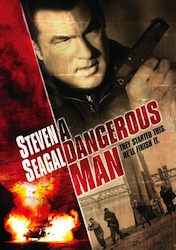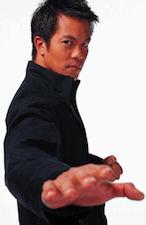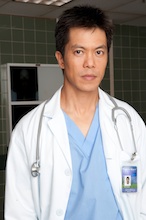Mann attended a British all-boys high school, where he was active in community theatre as both an actor and a writer. After graduating, Byron moved to California to study and received a degree in philosophy at UCLA, even though acting remained important to him. After college, Byron attended USC Law School, but took a sabbatical after the first year. Back in Hong Kong, he received an acting role in the NBC Movie TV movie Last Flight Out. He returned to Los Angeles, California, graduated from USC Law, passed the California bar, and pursued acting full time.
Jason: When did you realize that you wanted to become a professional actor?
Byron Mann: I fell into acting. I was actually studying to be a lawyer, during the first semester I felt like it wasn’t what I wanted to do. I was clerking in a law firm, and at the end of the clerkship, the senior partner sat me down and said, “I don’t think you should be a lawyer,” in a very caring way. I asked him, “How do you know?” and he said, “Because you have trouble coming to work in the morning and at 5p.m. you’re looking at your watch.” At that point I had no idea what I wanted to do. He said, “Do something you enjoy.” the only thing I remembered that I enjoyed doing was acting, in high school. I had been attending school in L.A., but I came back home and one thing led to another. Fairly soon after that I did my first movie, Street Fighter, That was like baptism by fire.
J: What was the casting process to land a large role in a high profile studio film?

J: Did you have any Martial Arts training beforehand?
BM: I do have a background in Martial Arts; however the filmmakers on Street Fighter hired Benny Urquidez. I didn’t know who he was in the beginning, I just thought he was a personal trainer, [laughs] I don’t follow fights much. Benny would kind of follow me around and make sure I lifted weights properly, so I figured he was my trainer. At some point it dawned on me that Benny is one of the greatest fighters in the world. He was hired to train us in Martial Arts and the various forms of fighting that each individual character would have in the film.
J: Do you have any recollections of filming Street Fighter that you can share?
BM: It was a very tumultuous shoot. We started filming in Thailand for about two months and then the production moved to Australia for another two months. There were a lot of big sets and many people working very hard. Our line producer had a heart attack four weeks in and left the project. It was a very stressful situation, but for me it felt like I was on a big vacation, I was just happy to be on set. To this day people recognize me from Street Fighter.
J: Street Fighter would turn out to be Raul Julia’s last film; Do you remember meeting him for the first time?
BM: I was in the middle of the Bangkok River, in a restaurant atop a boat having dinner. I was there to meet Damien Chapa who played ‘Ken’. Sitting maybe five yards away from us was this man; I leaned over and asked Damien, “Who is that?” He whispered in my ear “Raul Julia”. He has lost like 80 pounds at that point. I just didn’t recognize him because he has lost so much weight. Unfortunately Street Fighter was one of his last movies.
J: Due to the enormous world-wide success of ‘Street Fighter’ people began associating you with the character of ‘Ryu’. Do you feel that you have been type-cast to action/adventure films?

J: Did you see the 2009 follow-up film, Street Fighter: Legend of Chun-Li?
BM: Ironically when they were filming the sequel, I was in Thailand vacationing. One day I visited the set and just had a feeling that the project wasn’t going to be that great. I asked the producer how he could produce a movie based on a game that’s played predominantly by young males, but is centered on a female character. Sure enough, it came and went within a week or so. They simply chose the wrong character to build the film around.
J: What’s the difference between working on a TV show and making a feature film?
BM: Feature films hang around for longer. People can re-watch it on TV or rent the DVD, so generally a little more care goes into films. I started in features so I have a preference for it. Its like a first love. Having said that, there’s more and more TV work where the subject matter and the scripts are far more substantial. If you like working, the pace is a lot faster. On features there is a lot of waiting involved. You can hang around all day and do nothing just waiting for one shoot. Some people don’t like waiting around. For me, I go where the work is, wherever the material is interesting.
J: When reading a script, what are some aspects that may intrigue you to take on the project?
BM: You hear the older more experienced actors say it’s about the location, I find that’s true. If the location is good, I want to go there. Location is one thing, I also look for scripts, then analyze if the story is interesting and well told. Then you see who the director is. When I first started, it was more of who my character was. Is my character good? Now I see the project as a whole. I like to be a part of it. Big or small it doesn’t matter I just want to be part of the storytelling process. The script, the director and fellow actors are the biggest determining factors of whether I do a project or not.
J: Recently you were in the Steven Seagal film A Dangerous Man. I thought you gave a great performance. How did you get involved with that project?

BM: I almost didn’t do that movie. That was a last minute thing. A lot of the scenes for my character were made up at the last minute as well. For example, the scene where I pummeled this guy with a pistol was homage to the scene in The Untouchables where DeNiro beats a man to death with a bat. The character wasn’t drawn out in detail, but I had worked with Steven Seagal before so they called me. The weekend before the shoot the director Keoni Waxman and I sat down and we kind of hashed out this character and a few scenes. We literally started shooting that Monday.
J: You’ve re-teamed with both Seagal and Keoni Waxman on another project titled True Justice. Can you tell us about this new TV mini-series?
BM: Yes, It’ll be out very soon. They’re still shooting right now in Vancouver. It’s a series of two hour movies that will be shown back to back. It’s quite interesting. I really enjoyed reuniting with the director, Keoni Waxman; he’s a very talented guy. We have two other projects we are looking to collaborate on.
J: You’re also involved with a project that could possible lead to a TV series. What can you tell us about the series?
BM: It’s a project titled Befriend and Betray. It’s a factual based series about an undercover agent who infiltrated various gang groups like The Hells Angels, KKK, The Mongols and the Triads. It’s a two hour movie with a back door pilot. If the network picks it up, it will go into a weekly series. I play a guy who represents the Triads and the protagonist is trying to infiltrate and befriend. It’s one of the most colorful characters I’ve played. It’s fantastic. I have one or two projects I’m in the process of putting together right now. It takes an enormous amount of time to put them together, so they’re more of a labor of love.
J: You have been in the industry for almost twenty years now. Any secrets to the on-going success you’ve had?

BM: Its longevity, its like with anything, doing something for one to two years is not a big deal. Doing it for ten years is a challenge and takes persistence. Doing it for twenty years takes persistence, determination, and a little luck perhaps. I think the biggest challenge is to keep things fresh. If you are a one trick pony, the audience will get tired of you. That’s why character actors stay around the longest. The real challenge is to find new material and pen out new characters, so you’re not set in one box. That’s a little up to you, the audiences, and the filmmakers. It’s a combination of all. I’m pretty fortunate to still be here fifteen years later. I feel like I’m on a vacation every time I step on set. That’s my mentality.
J: You’ve worked with some of the biggest action icons of the last quarter century. What can you tell us about working with guys like Van Damme, Mark Dacascos, and Chuck Norris?
BM: They’re all different. Each man is wildly different from the other. Mark is a very nice guy. Steven Seagal is a good friend; he’s very mystical and quite interesting. JC and I have seen each other many times since Street Fighter in places like Hong Kong and Vancouver, everywhere but LA JC has his demons, but he is also a very nice guy. You should see his Jerry Louis impression, It’s hysterical. Chuck Norris, I couldn’t believe when he told me he was sixty. I said, “What? You look like you’re 45!” Chuck is such a soft spoken nice guy. Everyone is different; they each have their own persona.
J: What do you look for in a director when joining a film?
BM: A good director is a story teller. That’s going to be the bottom line. A lot of action choreographers or second unit directors find it hard to make the transition to feature directors. Story telling is a matter of taste, it’s about nuances. There’s a reason Danny Boyle’s movies are so well received. He can make a subtitled movie with unknown actors from India and win Oscars. There’s a reason, and its nuances and personal taste. I truly believe this. What people don’t realize is, I’ve collaborated with a lot of directors who work exclusively in TV and they’re easily some of the best directors I’ve worked with. They understand subtext; they understand scripts and how to work with actors. Most importantly they understand how to work in a very efficient manner. On the other hand, I’ve worked with some feature directors that weren’t so great. I can tell within the first fifteen minutes what kind of director I’m working for. Recently I worked with a fantastic female director named Kari Skogland on Bloodletting and Miraculous Cures, she also did 50 Dead Men Walking with Ben Kingsley and Jim Sturgess. A good director is one who can tell the story compellingly. It all stems from taste.
J: What can your fans expect from Byron Mann?


